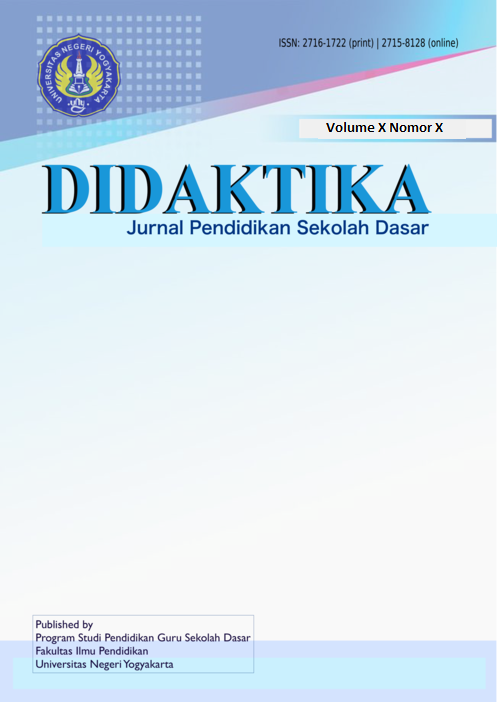Penerapan Model Contextual Teaching Learning Berbantuan Komika (Komik Matematika) untuk Siswa Sekolah Dasar
DOI:
https://doi.org/10.21831/didaktika.v4i1.36207Abstract
This study aimed to describe the improvement of mathematics learning outcomes in grade V at SDN Gajahmungkur 02 Semarang. This research was a classroom action research conducted in 3 cycles, each cycle consists of two meetings. The results showed that: (1) teacher skills in the first cycle score was 35,5 (good); in the second cycle score was 43,5 (very good); and in the third cycle score was 47 (very good), (2) students' activity in the first cycle score was 28,2 (good); in the second cycle score was 31,2 (very good); and in the third cycle score was 34,8 (very good), (3) learning ambiance in first cycle obtained 5,5 (good); in the second cycle got 6,5 (very good); and in the third cycle reached 7,5 (very good), (4) learning material in first cycle obtained 6 (very good); in the second cycle got 6,5 (very good); and in the third cycle reached 8 (very good), (5) learning media in first cycle obtained 8 (good); in the second cycle got 10 (very good); and in the third cycle reached 12 (very good), (6) learning result of students' learning outcome in first cycle obtained 69,2%; in the second cycle got 76,9%; and in the third cycle reached 88,5%. Thus, the application of the contextual teaching learning model assisted by mathematics comic media can improve student learning outcomes.
Keywords: Contextual Teaching Learning, Mathematical Comics, Student Learning Outcomes, Elementary School
========================================================================================================
Tujuan penelitian ini adalah mendeskripsikan peningkatan hasil belajar matematika pada siswa kelas V SDN Gajahmungkur 02 Semarang. Penelitian ini merupakan penelitian tindakan kelas yang dilaksanakan 3 siklus, setiap siklus terdiri dari 2 pertemuan. Hasil penelitian menunjukkan: (1) keterampilan guru siklus I skornya 35,5 (baik), siklus II skornya 43,5 (sangat baik), siklus III skornya 47 (sangat baik), (2) aktivitas siswa siklus I skornya 28,2 (baik), siklus II skornya 31,2 (baik), siklus III skornya 34,8 (sangat baik), (3) iklim pembelajaran siklus I skornya 5,5 (baik), siklus II 6,5 (sangat baik), siklus III 7,5 (sangat baik), (4) materi pembelajaran siklus I skornya 6 (sangat baik), siklus II 6,5 (sangat baik), siklus III 8 (sangat baik), (5) media pembelajaran siklus I skornya 8 (baik), siklus II 10 (sangat baik), siklus III 12 (sangat baik), (6) hasil belajar siklus I memperoleh ketuntasan belajar 69,2%, siklus II 76,9%, siklus III 88,5%. Dengan demikian penerapan model contextual teaching learning berbantuan media komik matematika dapat meningkatkan hasil belajar siswa.
Kata kunci: Contextual Teaching Learning, Komik Matematika, Hasil Belajar Siswa, Sekolah Dasar
References
Anggono, W., & Denny Indrayana S. (2014). Perancangan Buku Komik Matematika Khusus Siswa Kelas IV dengan Konsep Magic of Maths. Jurnal Sains & Seni ITS, 2(3), 60–63. https://doi.org/10.12962/j23373520.v3i1.6059
Arikunto, S. (2010). Penelitian Tindakan Kelas. Jakarta: Bumi Aksara.
Daryanto. (2013). Media Pembelajaran Peranannya sangat Penting dalam Mencapai Tujuan Pembelajaran. Yogyakarta: Gava Media.
Haryoto, S., & Narimo, S. (2013). Contextual Math Learning Based on Lesson Study Can Increase Study Communication. International Journal of Education. 4(5): 48-60. https://doi.org/10.5296/ije.v5i4.4440
Mardiana, L. (2013). Penerapan Pendekatan Contextual Teaching And Learning Dalam Pembelajaran Matematika Pada Materi Faktorisasi Suku Aljabar Di Kelas VIII SMP Negeri 2 Padangpanjang. Jurnal FKIP Universitas Muhammadiyah Sumatera Barat, 1(1), 1–15.
Rasiman, & Pramasdyahsari, A. S. (2014). Development of Mathematics Learning Media E- Comic Based on Flip Book Maker to Increase the Critical Thinking Skill and Character of Junior High School Students. International Journal of Education and Research, 11(2), 535–544.
Shofan, M. (2013). Pengembangan Modul Pembelajaran Bilangan Bulat Dengan Pendekatan Kontekstual Untuk Siswa Kelas IV SD/MI. Jurnal Pendidikan Matematika, 1(1), 1–7.
Shoimin, A. (2014). 68 Model Pembelajaran Inovatif dalam Kurikulum 2013. Yogyakarta: In AR-RUZZ MEDIA.
Sholikin. (2012). Upaya Meningkatkan Hasil Belajar Siswa Pada Mata Pelajaran Matematika dengan Model Pembelajaran Contektual Teaching Learning (CTL) Di Kelas V Semester I MI Sendang Tersono Batang Tahun Ajaran 2011/2012. Jurnal IAIN Walisongo, 1(1), 1–9.
Sitorus, R., & Erlita Siburian. (2011). Meningkatkan Minat Belajar Siswa Dengan Menggunakan Pendekatan Kontekstual Pada Pokok Bahasan Penjumlahan Pecahan Di Kelas V SD Negeri No. 015897 Buntu Pane. Jurnal Pendidikan Matematika, 1(1), 9–18.
Sukri, M. (2014). Penerapan Contextual Teaching Learning untuk Meningkatkan Hasil Belajar Siswa Dalam Menyelesaikan Soal Cerita Penjumlahan dan Pengurangan Pecahan di Kelas V SDN Inpres Balaroa Palu. Jurnal Elektronik Pendidikan Matematika Tadulako, 2(1), 159–169.
Supriadi, Suryadi, D., Sumarmo, U., & Rakhmat, C. (2014). Developing Mathematical Modeling Ability Students Elementary School Teacher Education Through Ethnomathematics-Based Contextual Learning. International Journal of Education and Research, 8(2), 439–452.
Trianto. (2011). Model-model Inovatif Berorientasi Kontruktivistik. Jakarta: Pustaka Pelajar.
Widoyoko, E. P. (2013). Teknik penyusunan instrumen penelitian. Yogyakarta: Pustaka Pelajar.
Yenti, I. N. (2016). Pendekatan Kontekstual (CTL) dan Implikasinya dalam Pembelajaran Matematika. Ta'dib, 2(12), 118–125. https://doi.org/10.31958/jt.v12i2.161
Downloads
Published
How to Cite
Issue
Section
Citation Check
License
- Authors retain copyright and grant the journal right of first publication with the work simultaneously licensed under a Creative Commons Attribution License that allows others to share the work with an acknowledgement of the work's authorship and initial publication in this journal.
- Authors are able to enter into separate, additional contractual arrangements for the non-exclusive distribution of the journal's published version of the work (e.g., post it to an institutional repository or publish it in a book), with an acknowledgement of its initial publication in this journal.
- Authors are permitted and encouraged to post their work online (e.g., in institutional repositories or on their website) prior to and during the submission process, as it can lead to productive exchanges, as well as earlier and greater citation of published work.






